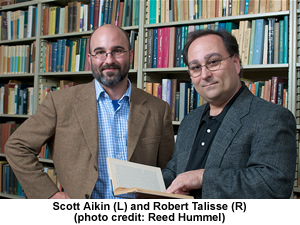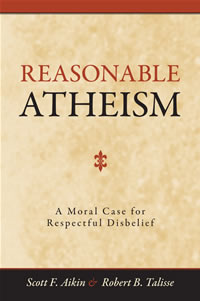Moral, Not Faithful
In Reasonable Atheism, a pair of Vanderbilt professors argue that atheism is as morally defensible as any religious tradition
As much hostility as adherents of the world’s religions tend to display toward each other, they reserve their greatest animosity for those who reject religion outright. Because atheists deny the notion of a supreme spiritual authority, they are often derided as amoral, libertine, or, in perhaps the biggest slight of all, moral relativists. In Reasonable Atheism, Vanderbilt philosophy professors Scott F. Aikin and Robert B. Talisse argue just the opposite. If anything, they say, atheists can be more moral than believers because their moral principles are worked out in the real world, relying on logic and reason rather than religious dogma.
Unlike “New Atheists” Sam Harris and Christopher Hitchens, the authors of Reasonable Atheism don’t seek to eradicate religion. Though they clearly believe religion is wrong-headed, even dangerous, their goal instead is to show that godlessness is a reasonable position and deserves the same respect afforded mainstream belief systems. Further, Aikin and Talisse argue that believers who don’t intellectually engage with atheism aren’t behaving as responsible moral actors. For them, the difference between moral and immoral people is a matter of behavior and character rather than religious belief.
Reasonable Atheism begins by examining what the authors call “Mom’s Maxim,” the notion that it’s impolite to discuss matters of religion or politics in mixed company. While acknowledging the need to be polite, they maintain that core beliefs like religion and politics are exactly the sort of things that should be discussed in mixed company—that is, among people who hold differing views. Because our core beliefs are central to who we are, it is of utmost importance to ensure that these views are correct, and what better way to ensure correctness, ask Aikin and Talisse, than “to take seriously the reasons, arguments, and criticisms of those who disagree”?
 With the door open for dialogue, Reasonable Atheism sets about constructing a rational moral system that doesn’t require religious adherence. The brand of atheism Aikin and Talisse advocate gets its moral force from what they call an “ethics of belief.” Belief, they argue, is an active enterprise with both inward-seeking and outward-seeking components. On the inward side, moral actors must continually appraise the validity of the reasons behind what they believe. On the outward side, an ethics of belief requires that we consider the effect our beliefs and conduct have on others. Christianity, they maintain, fails to satisfy on both counts. Consider, for example, the conviction that all objective truth comes from God. If you hold this belief, then there’s really no need to appraise anything: if God forbids it, it’s wrong, and you disobey at your peril. But, the authors argue, this position confuses self-interest with morality. True morality, they say, depends on interpretation and moral reasoning, without which it’s impossible to make sense of God’s commands. How, for instance, should the believer take the biblical command in Deuteronomy 17 to stone non-believers to death?
With the door open for dialogue, Reasonable Atheism sets about constructing a rational moral system that doesn’t require religious adherence. The brand of atheism Aikin and Talisse advocate gets its moral force from what they call an “ethics of belief.” Belief, they argue, is an active enterprise with both inward-seeking and outward-seeking components. On the inward side, moral actors must continually appraise the validity of the reasons behind what they believe. On the outward side, an ethics of belief requires that we consider the effect our beliefs and conduct have on others. Christianity, they maintain, fails to satisfy on both counts. Consider, for example, the conviction that all objective truth comes from God. If you hold this belief, then there’s really no need to appraise anything: if God forbids it, it’s wrong, and you disobey at your peril. But, the authors argue, this position confuses self-interest with morality. True morality, they say, depends on interpretation and moral reasoning, without which it’s impossible to make sense of God’s commands. How, for instance, should the believer take the biblical command in Deuteronomy 17 to stone non-believers to death?
“No one is good in virtue of rote obedience to commands,” write Aikin and Talisse, “even if those commands come from God.” This puts atheists in a unique position: because they aren’t forced to rationalize the existence of evil—and thus make a moral exception for God—atheists alone have the capacity to be consistent in their moral judgments.
 Lest they be accused of being too firmly entrenched in the modernist camp, Aikin and Talisse are quick to note that life is messy. In the real world, values conflict. Take, for example, the duty to be truthful and the duty to avoid hurting someone’s feelings. In such cases, say the authors, “we can do no better than to try to coordinate our best and most reflectively held judgments.” Still, Reasonable Atheism takes for granted the idea that truth flows naturally from logic, a decidedly modernist assumption. Because they argue against first-cause principles, the God that Aikin and Talisse reject is necessarily hegemonic and overwhelming. But it’s possible to look to other forms of proof to show that this definition isn’t the only option. A proof from quantum mechanics, for example, might demonstrate that God—or the Universe, if one rejects God—is a form of consciousness or series of consciousnesses. In any case, the unknown doesn’t have to be bound by decidedly Western logic, which, it bears mentioning, is as much a socially learned skill as language or mathematics.
Lest they be accused of being too firmly entrenched in the modernist camp, Aikin and Talisse are quick to note that life is messy. In the real world, values conflict. Take, for example, the duty to be truthful and the duty to avoid hurting someone’s feelings. In such cases, say the authors, “we can do no better than to try to coordinate our best and most reflectively held judgments.” Still, Reasonable Atheism takes for granted the idea that truth flows naturally from logic, a decidedly modernist assumption. Because they argue against first-cause principles, the God that Aikin and Talisse reject is necessarily hegemonic and overwhelming. But it’s possible to look to other forms of proof to show that this definition isn’t the only option. A proof from quantum mechanics, for example, might demonstrate that God—or the Universe, if one rejects God—is a form of consciousness or series of consciousnesses. In any case, the unknown doesn’t have to be bound by decidedly Western logic, which, it bears mentioning, is as much a socially learned skill as language or mathematics.
But disproving the existence of God is only the by-product of Reasonable Atheism. For Aikin and Talisse, the main goal is to disprove the notion that religious people have a monopoly on good behavior. They maintain that religious belief not only impedes true ethical behavior, it stands in the way of democracy itself. Because democracy requires that laws be based on reason, citizens act immorally when they vote solely on the basis of religious conviction. “One’s civic obligations,” they say, “are different from the requirements that derive from one’s religious beliefs.”
Above all, Reasonable Atheism seeks to correct the idea that atheists are immoral and self-serving. For this reason alone, the book should be required reading for anyone with the courage to consider seriously their own beliefs—especially if one of those beliefs includes the notion that secularism is gradually eroding this country’s moral base. “We have tried to lay the groundwork for a civil and reasonable public debate about God, morality, and democracy,” the authors write. “With this aim in mind, we have tried to articulate a workable conception of responsible, intellectual engagement among adversaries.” In a political climate that’s increasingly charged by matters of religion, attaining that goal seems more and more important.


